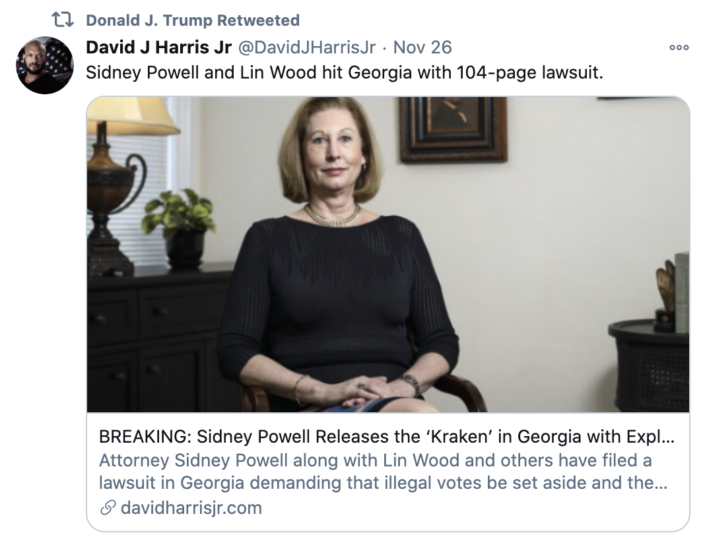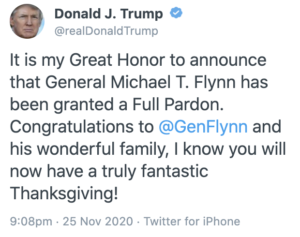The “Crazy” Kraken Conspirator
Sidney Powell is undoubtedly co-conspirator 3 in Trump’s January 6 indictment.
Co-Conspirator 3, an attorney whose unfounded claims of election fraud the Defendant privately acknowledged to others sounded “crazy.” Nonetheless, the Defendant embraced and publicly amplified Co-Conspirator 3’s disinformation.
But her role — as described — is actually very limited. Just one paragraph describes her actions:
20. On November 16, 2020, on the Defendant’s behalf, his executive assistant sent Co-Conspirator 3 and others a document containing bullet points critical of a certain voting machine company, writing, “See attached – Please include as is, or almost as is, in lawsuit.” Co-Conspirator 3 responded nine minutes later, writing, “IT MUST GO IN ALL SUITS IN GA AND PA IMMEDIATELY WITH A FRAUD CLAIM THAT REQUIRES THE ENTIRE ELECTION TO BE SET ASIDE in those states and machines impounded for non-partisan professional inspection.” On November 25, Co-Conspirator 3 filed a lawsuit against the Governor of Georgia falsely alleging “massive election fraud” accomplished through the voting machine company’s election software and hardware. Before the lawsuit was even filed, the Defendant retweeted a post promoting it. The Defendant did this despite the fact that when he had discussed Co-Conspirator 3’s far-fetched public claims regarding the voting machine company in private with advisors, the Defendant had conceded that they were unsupported and that Co-Conspirator 3 sounded “crazy.” Co-Conspirator 3’s Georgia lawsuit was dismissed on December 7.
Go back and look! Her most famous role — when she got cleared into the White House and told Trump he should make her Special Counsel and seize the voting machines — doesn’t appear at all. Indeed, my greatest disappointment with the indictment is that it doesn’t explain one of the enduring mysteries of January 6: what led Trump to adopt January 6 as his plan shortly after that meeting.
It describes Trump’s December 19 tweet — the tweet that triggered thousands of MAGAts to start planning a trip to DC — but not what led up to it.
Curse you, Jack Smith!!!
What a remarkable structure, then, for including Sidney Powell in this indictment.
From the description of Powell at the beginning, it makes it sound like she is in there as proof that Trump knew his claims were false: In November, he declared her crazy. But he nevertheless kept magnifying her craziness.
That would almost help prove that Trump knew she was a liar when he used her propaganda.
But paragraph 20 says something different: It says that on November 16, on a date she was still ostensibly on Rudy’s team, Trump fed her the Dominion voting machine false claims and told her — Trump told Powell, not vice versa — to include the Dominion claims.
The false claims about Dominion, according to this, came from Trump.
And then, after Rudy and Jenna Ellis publicly separated themselves from her, Powell submitted the first of a number of lawsuits that would rely on the Dominion claim.
And when called on her crazy, Sidney Powell claimed that, “no reasonable person would conclude that [her] statements were truly statements of fact.”
It’s not just Trump who thinks she’s crazy, she thinks she’s crazy.
But once she filed that lawsuit, on November 25, Trump boosted it.
That’s all pretty interesting timing given something else that was occurring at the very same time. At a time when they were both together in South Carolina plotting how to steal the election for Trump, Trump pardoned Mike Flynn.
The same crazy that went into Sidney Powell’s election disinformation went into her claims about Flynn. If Trump thought she was crazy, he should never have pardoned Flynn.
It gets still more interesting from there — including to where Powell funded at least some of the Oath Keepers’ defense — including, possibly, Kelly Meggs’ attorney, Stan Woodward.
You get the idea.
Even without her plan to seize the voting machines on December 18, even without Flynn’s call for martial law in the days leading up to it, the timeline laid out in the indictment — where Trump gave Powell the Dominion claims, then decided she was crazy, then pardoned her client based off her crazy claims — sure piles up some interesting implications in what are just two paragraphs of a 130-paragraph indictment.


